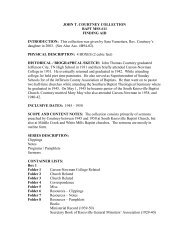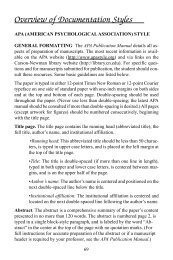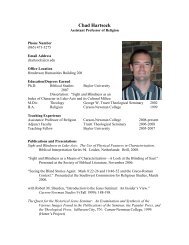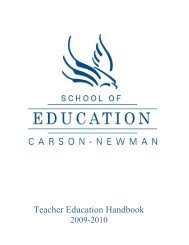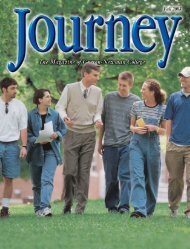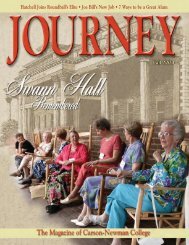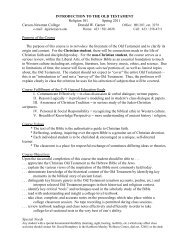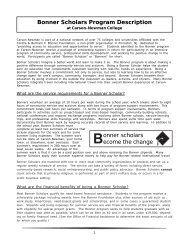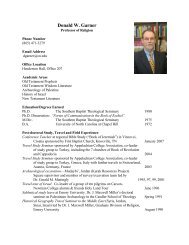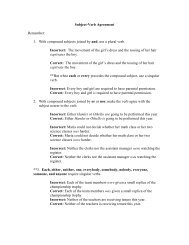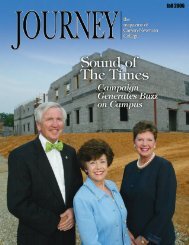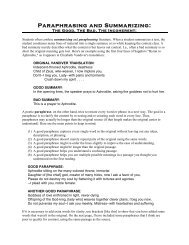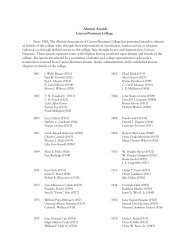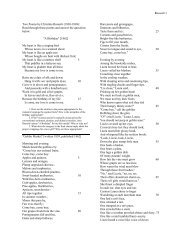Winter 2010 - Carson-Newman College
Winter 2010 - Carson-Newman College
Winter 2010 - Carson-Newman College
You also want an ePaper? Increase the reach of your titles
YUMPU automatically turns print PDFs into web optimized ePapers that Google loves.
The Future of the Past:Celebrating our Heritage and HopeEditor’s note: In preparing for his inauguration, Dr. O’Brienedited his remarks to fit within the program’s allotted time. Thefollowing represents his full manuscript.Distinguished platform guests, esteemed Board of Trustees,illustrious presidents and notable colleagues from sister institutions,treasured faculty, staff, students, and alumni, and beloved familyand friends:The Psalmist says it so well: “This is the day the LORD has made;let us rejoice and be glad in it!” (Ps. 118:24)May I thank each of you for being here today? How absolutelygracious of you! I would love to call each of you by name, but thatwould take all of my allotted hour and forty-five minutes. (laughter)However, I simply must thank the Presidential Search Committeeand the Board of Trustees for extending the call to us to serve thisincredible <strong>Carson</strong>-<strong>Newman</strong> family. To Search Committee ChairOgle I would like to say a special thanks for your leadership andfriendship in the process, and my dear friend, for your exceedinglygracious introduction today.The Inauguration Committee, co-chaired by Deans Clark Measelsand Kitty Coffey, worked long, hard, sacrificially, and well to makethese days a success. I am grateful to each of you.Kay and I have been so warmly welcomed to East Tennessee. Thefaculty, staff, students, alumni, community, convention, pastors,and churches have all made us feel right at home. And we are!Senator Alexander, your untiring public service as president ofthe University of Tennessee, as governor, as U.S. Department ofEducation secretary, and now as our senator has provided us amodel of visionary leadership. You traveled a long way to deliveryour inspiring words to us today, but your words will travelfarther. You have spoken prophetically in the national conversationregarding higher education and we have listened. Moreover, wewill act. Beginning in January we will offer 10 or more programsof study wherein students may receive a baccalaureate degree in 3years. We have entered a new era in higher education.Obsolescence is not limited to manual typewriters, 8-tracktape cartridges, party-line telephones, and Edsel automobiles.Senescence is not limited to America’s roads, bridges, anddowntowns. Everything ages, including higher education; muchbecomes obsolete, including academic programs, informationdelivery systems, and approaches to education.“The Golden Age of American <strong>College</strong>s is past; the Age of Survivalis upon us.” So say some of the experts in our field. If, in fact, thisclaim is true, institutions who fail to comprehend current dangersand adapt will not survive.Accessibility and affordability are major issues, along withyears of study required to complete a degree. There are others.Distinguishing between price and cost is critical. For it’s hard tocontrol the price of a college education when the costs continueto soar, which include energy, insurance, maintenance of agingbuildings, construction costs of new facilities, health care,technology, salary needs and other operational costs. Changes mustcome in innovative pricing, degree reform, green initiatives, budgetdecentralization and accountability, organizational and structuralreform, alternative scheduling, distance learning, graduation rates,continuing education, and in globalization of higher education.Senator Alexander, we appreciate your seasoned service andwisdom, your watchful eye, prophetic voice, and authoritativeleadership in higher education. Thank you for your importantwords today.My remarks which follow will move along a different track, oneno less critical, no less urgent. We are in a crisis. But before weaddress the present crisis, much less the future, we must take noteof the past.Oh, what a glorious past we share, <strong>Carson</strong>-<strong>Newman</strong> <strong>College</strong>and our sister American colleges and universities! First, <strong>Carson</strong>-<strong>Newman</strong>: When the Baptist Education Society of East Tennesseecalled a meeting at the Dandridge Baptist Church in 1849 toconsider founding “an institution of learning” 21 trustees wereelected to raise money and secure a charter. One of the leaders wasJames <strong>Carson</strong>, for whom the school would eventually be named.The host pastor was William Rogers, who would become the firstpresident of the school.Around that time in nearby Mossy Creek, later, in 1901, to becomeknown as Jefferson City, five gentlemen known today as “The OakTree Five” met under an old oak tree after a hard day’s work in thefields and determined to create a place of education for their sons—and later their daughters, as well. These five men—the ReverendWilliam Bowen, Professor Robert Reedy Bryan, and three farmerbuildersnamed <strong>Newman</strong>: I.M., Samuel, and William—alongwith the aforementioned trustees secured two acres of land on thebanks of Mossy Creek just below our current baseball field, raised$2,386.50 to start the School, named Mossy Creek Missionary BaptistSeminary, and began holding classes in the Mossy Creek Baptist Church.Soon, in 1855, Mossy Creek Missionary Baptist Seminary changedits name to Mossy Creek Baptist <strong>College</strong>. The first graduate was adoctor, the second a lawyer, and the third, a minister.The 1876-77 mission statement of Mossy Creek Baptist <strong>College</strong>noted: “This institution looks to the highest possible grade ofintellectual and Christian culture of all its pupils.”In 1880 the trustees changed the name of our school to <strong>Carson</strong><strong>College</strong>, in honor of James <strong>Carson</strong>, a founder and 30-year trustee.Five years later in 1885, The Mossy Creek Female Academy waschartered and soon became known as <strong>Newman</strong> Female Seminary,then <strong>Newman</strong> <strong>College</strong>, in honor of the <strong>Newman</strong> family of founders.The two colleges, <strong>Carson</strong> and <strong>Newman</strong> became one: <strong>Carson</strong>-<strong>Newman</strong> <strong>College</strong> in 1889.The 1919-20 mission statement of <strong>Carson</strong>-<strong>Newman</strong> <strong>College</strong>emphasized: “It has always been the purpose of the <strong>College</strong> to offerits students instruction in the light of the teachings of Jesus Christ.…The <strong>College</strong> owes its allegiance to Christ and considers itself anagency for the spread of His righteousness among men.”The 1993-94 mission statement proclaimed: “We purpose to:…develop graduates who understand that the lordship of Christtouches all vocations and professions and involves the graduates inbecoming leaders in church and state.”What a glorious past!Conceived in a church, along with echoes of Eden’s Tree andthe Tree planted by streams of water in Psalm 1 reverberatingnuminously around the Oak Tree Five, with classes born in thechurch, this sacred academy, indeed, stands as a testament toProvidence and prayer.Yet, we are but a star within a breathtaking galaxy. The birth ofnearly all colleges in America before 1865 came forth from churchorganizations or devout Christians with intentional Christian endsin mind.• Harvard (1636) was established by Congregationalists.• William & Mary (1693) was established by Anglicans.• Yale (1701) was founded by Congregationalists.• Princeton (1747) was founded by Presbyterians.• Brown (1765) and the University of Chicago were foundedby Baptists.• Other church colleges of distinction include Columbia(1754), Penn (1755), and Dartmouth (1769).Harvard’s motto in 1650 proclaimed Christi Glorium, (Glory toChrist). Her motto in 1692 became Christo et Ecclesiae, (Christ andChurch). Harvard’s earliest set of “Rules and Precepts” decreed thateach student was: “to be plainly instructed, and earnestly pressed toconsider well, the main end of his life and studies is, to know Godand Jesus Christ which is eternal life…and therefore to lay Christin the bottom, as the only foundation of all sound knowledge andlearning.”Yale’s stated purpose from the beginning was, “to teach and engagethe children to know God in Jesus Christ and to love and serve himin all sobriety, godliness, and righteousness of life….”The first public announcement regarding the University of Chicagoread: “The new University is to be a Christian institution. It is tobe forever under the auspices of the Baptist denomination.” Herfirst president announced that the: “President and two thirds ofits Trustees will be Baptists…. In all and above all and under all,the University of Chicago, whatever else it may be, by the graceof God shall be Christian in tone, in influence, and in work. Theprovisions of this charter…are pledges to you that this shall alwaysremain true.”Dartmouth President, Asa Smith, charged in his inaugural addressof 1863 that: “The <strong>College</strong>…should be distinctly and eminentlyChristian…. Let the studies which we call moral, have a Christianbaptism…. Let Ethical Science…be bathed in the light of Calvary.”President’s Smith charge of 1863 came as late as 100 years afterDartmouth’s founding.By the early 1900s, however, the secularization of higher educationhad displaced the dominant Christian intellectual position in stateuniversities and major private universities, and by the 1960s, inmost church colleges, as well.Aware of the dangers of the secular way, Yale President, CharlesSeymour, in his inaugural address in 1937, called for a return to ourChristian heritage and hope declaring:22 JOURNEY winter <strong>2010</strong> JOURNEY winter <strong>2010</strong> 23



